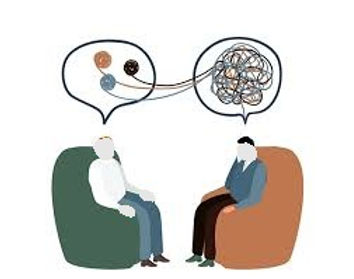Getting the Most from Therapy
- Yanky Sigal

- Feb 25
- 3 min read
Updated: Jun 15
Therapy can be a powerful tool for personal growth, emotional well-being, and deepening self-awareness. From a Torah perspective, the process of self-improvement is fundamental to our avodas Hashem. Chazal teach us, "אין אדם רואה נגעי עצמו" – "A person does not see his own flaws" (Nega'im 2:5), highlighting the need for external guidance to recognize and correct our shortcomings. Just as we seek a Rav or mentor for spiritual matters, a therapist can serve as a guide in navigating emotional and psychological challenges.
However, to fully benefit from therapy, we must approach it with the right mindset and strategies.
Commitment
One of the most important factors in successful therapy is the personal commitment to change. Chazal teach, בַּדֶּרֶךְ שֶׁאָדָם רוֹצֶה לֵילֵךְ בָּהּ – מוֹלִיכִין אוֹתוֹ In the path a person wants to go, they are led" (Makkos 10b). A person must genuinely desire to help themselves and be willing to put in the necessary effort. Without an internal motivation for growth, even the best therapy will have limited impact.
Honesty
The foundation of any meaningful growth is the willingness to hear and accept the truth, even when it is uncomfortable. Therapy is most effective when approached with honesty and openness. Suppressing emotions or avoiding difficult truths will only hinder progress.
Active Participation
Chazal teach, "לא עליך המלאכה לגמור, ולא אתה בן חורין ליבטל ממנה" – "It is not upon you to complete the work, but neither are you free to desist from it" (Pirkei Avos 2:16). Therapy is not a passive process; it requires active effort. Preparing before sessions, reflecting afterward, and implementing the insights gained are crucial for making meaningful progress. If a person merely attends sessions without engaging in the work outside of them, they may find themselves stagnating.
Trust in the Process
It is natural to experience moments of frustration or impatience in therapy. True change takes time, just as spiritual growth is a lifelong journey. A person in therapy must have patience with themselves and trust the process, understanding that progress is not always linear.
Daven for Siyata Dishmaya
While therapy is a practical tool, we must never forget that ultimate healing and growth come from Hashem. Turning to Him in tefillah can provide the inner peace, resilience, and guidance necessary to navigate the challenges and opportunities of therapy.
Aligning Therapy with Torah Values
Not all therapeutic approaches align with Torah hashkafa (perspective). It is important to ensure that therapy is being used as a tool for growth within the framework of avodas Hashem. Consulting with a Rav when faced with ethical or halachic questions regarding therapy can help maintain the proper balance between psychological well-being and spiritual integrity.
Gratitude for Progress
Chazal emphasize the importance of gratitude, as we say "מודים אנחנו לך" every day in Shemoneh Esrei. Recognizing and appreciating even small improvements in our emotional well-being can encourage continued growth. Celebrating small victories fosters a positive mindset and keeps a person motivated in their journey.
Therapy, when approached with sincerity and effort, can be a powerful tool for self-refinement, emotional stability, and ultimately enhancing one's avodas Hashem. Just as we invest in learning Torah and improving our middos, investing in our emotional well-being through therapy is another way to fulfill our tafkid (purpose) in this world. With honesty, effort, patience, tefillah, and gratitude, we can maximize the benefits of therapy, leading to greater emotional well-being, inner peace, and a stronger ability to serve Hashem and support those around us with clarity and purpose.



